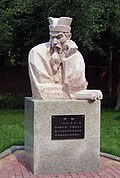Human nature
Human nature refers to the distinguishing characteristics, including ways of thinking, feeling and acting, which humans tend to have naturally, independently of the influence of culture. The questions of what these characteristics are, how fixed they are, and what causes them are amongst the oldest and most important questions in western philosophy. These questions have particularly important implications in ethics, politics, and theology. This is partly because human nature can be regarded as both a source of norms of conduct or ways of life, as well as presenting obstacles or constraints on living a good life. The complex implications of such questions are also dealt with in art and literature, while the multiple branches of the Humanities together form an important domain of inquiry into human nature and into the question of what it is to be human.
Theories of human nature
Many different theories of human nature have been proposed in Western philosophy, Eastern philosophy, and in the different world religions.
Western philosophy
In Western philosophy, there are several traditional theories of human nature. These include the theory of the Platonic soul, the Christian doctrine of original sin, the Enlightenment theory of natural rights, and the Marxist conception of human nature as historical product.
Eastern philosophy
In Eastern philosophy, human nature is a central theme in Confucianism, Taoism, Buddhism, and Hinduism.
World religions
In the world religions, human nature is a key concept. In Christianity, human nature is the result of the Fall of Man, while in Islam, human nature is considered good but imperfect.
See also
- Philosophy of mind
- Philosophy of human nature
- Human condition
- Human behavior
- Human evolution
- Human rights
- Humanism
References
Transform your life with W8MD's budget GLP-1 injections from $125.
W8MD offers a medical weight loss program to lose weight in Philadelphia. Our physician-supervised medical weight loss provides:
- Most insurances accepted or discounted self-pay rates. We will obtain insurance prior authorizations if needed.
- Generic GLP1 weight loss injections from $125 for the starting dose.
- Also offer prescription weight loss medications including Phentermine, Qsymia, Diethylpropion, Contrave etc.
NYC weight loss doctor appointments
Start your NYC weight loss journey today at our NYC medical weight loss and Philadelphia medical weight loss clinics.
- Call 718-946-5500 to lose weight in NYC or for medical weight loss in Philadelphia 215-676-2334.
- Tags:NYC medical weight loss, Philadelphia lose weight Zepbound NYC, Budget GLP1 weight loss injections, Wegovy Philadelphia, Wegovy NYC, Philadelphia medical weight loss, Brookly weight loss and Wegovy NYC
|
WikiMD's Wellness Encyclopedia |
| Let Food Be Thy Medicine Medicine Thy Food - Hippocrates |
Medical Disclaimer: WikiMD is not a substitute for professional medical advice. The information on WikiMD is provided as an information resource only, may be incorrect, outdated or misleading, and is not to be used or relied on for any diagnostic or treatment purposes. Please consult your health care provider before making any healthcare decisions or for guidance about a specific medical condition. WikiMD expressly disclaims responsibility, and shall have no liability, for any damages, loss, injury, or liability whatsoever suffered as a result of your reliance on the information contained in this site. By visiting this site you agree to the foregoing terms and conditions, which may from time to time be changed or supplemented by WikiMD. If you do not agree to the foregoing terms and conditions, you should not enter or use this site. See full disclaimer.
Credits:Most images are courtesy of Wikimedia commons, and templates, categories Wikipedia, licensed under CC BY SA or similar.
Contributors: Prab R. Tumpati, MD


